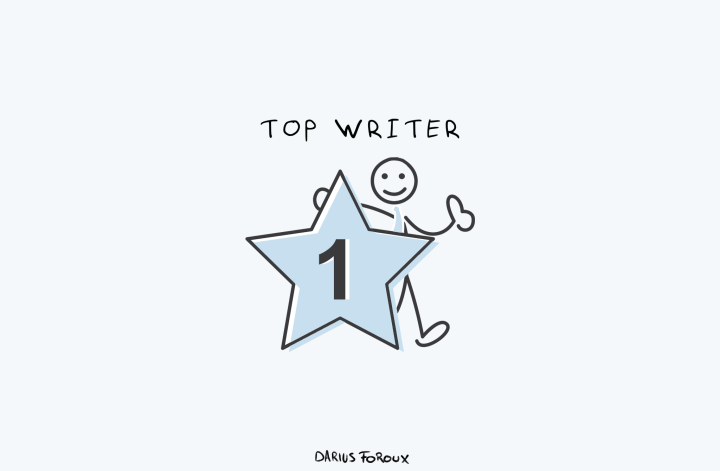I started my blog as an independent new writer in 2015. Over the years, I’ve published over 400 articles, 7 books, and 7 online courses.
There have been frustrations and challenges along the way. But I’ve learned that new writers have a better chance of success when they avoid common mistakes and follow “best practices” from the start.
“Success” can mean different things. To me, it’s about making a good living. Not necessarily to get rich (which is also great, but not the primary goal).
Here are 5 important lessons I’ve learned about success as a writer. These things might sound obvious, but I wouldn’t overlook them. Success is often simpler than we think.
It’s all about the execution. Here we go.
Stick to a limited research time
“Where do I get ideas?” “What do I write about?” “I’m stuck with my writing!”
Whether you’re writing an article, book, or email — when you feel stuck, it’s usually because you’re out of ideas or insight.
This means you need more research. You can read a relevant book or article on the matter. Or watch documentaries and talk with mentors.
Just remember: Try not to get overly stuck in the research.
We always want to execute things as soon as possible. For example, if you’re writing a blog article about meditation, you don’t need to read every book on meditation.
When you do your research, give yourself a reasonable time limit. And stick to that.
Think about 1 person
When people talk about writing for a target market, new writers tend to define a whole batch of people, like, “I want to write for all millennials.” Which is fine. But that’s easier said than done. Unless you’ve put your writing out there and gotten real-world feedback, it’s hard to assume what kind of writing will resonate with your audience.
I’ve seen that with my own readers as well. My newsletter includes a variety of people from all walks of life: 70-year-old retirees, students, middle-aged small business owners, professionals in their late twenties, Fortune 500 company executives, and so forth.
The solution? Think of 1 person. That’s an easier and more effective strategy. Then ask yourself:
- Who is this for?
- What major problems/concerns are occupying this person’s mind?
- How can my piece help solve my reader’s problem/concern?
When you focus on one person, your writing becomes clearer and more direct. That’s also how you can discover your unique writing style.
Try to avoid the natural impulse to please everyone. You just might be surprised at the kind of people who would actually like your work.
Avoid “proving” your point
When I started writing, I often made a mistake that’s common among new writers: Over-explaining. I was afraid my readers wouldn’t understand or appreciate what I’m trying to say. So I compensate by proving myself with my words.
But that does the opposite effect. Previously, I talked about how trying too hard makes you less persuasive. That’s true for writing as well.
To borrow a phrase from Kevin Hart, writing is “like farting. If you push too hard, things could get messy real fast.”
When you overexplain, you tend to use more words than is necessary. Effective writing is all about saying just enough. Also, when people try too hard, it makes them look weak or needy.
Cut out announcements
We sometimes do it in natural conversations.
- “Here’s an interesting story.”
- “What I’m about to tell you will definitely blow your mind.”
Sometimes, we have trouble getting straight to our point. We’re telling, not showing.
When you’re used to announcing things, instead of just going straight to your point/story/idea, it can become a habit. So a good rule of thumb is to try removing the first sentence or paragraph of your writing when you edit.
“Show, don’t tell,” as the cliche goes. Never ignore that lesson!
Serve the reader
Think about those salespeople who approach you on the street and shove their flyers or products into your hands. Or how about car salesmen who apply tactics on you. “Someone came by this morning who really wanted that car.” Yeah, right.
Even when we need products, we probably won’t buy them from people who try to deceive us.
No one wants to feel like they’re sold something. It’s the same with writing. Readers are smart. People will instantly tell whether you’re trying to trick them.
Writing must come from the heart! It must be honest. Otherwise it will never make an impact.
When you make the reader your focus, your writing will be heard. Dale Carnegie said it best in the classic, How to Win Friends and Influence People:
“Talk to someone about themselves and they’ll listen for hours.”
When we’re writing, it’s not about us. It’s always about the reader. When we focus on informing, entertaining, or helping our readers, rather than selling, we will actually provide value to our readers. And when we provide value, others will reward us for it.




